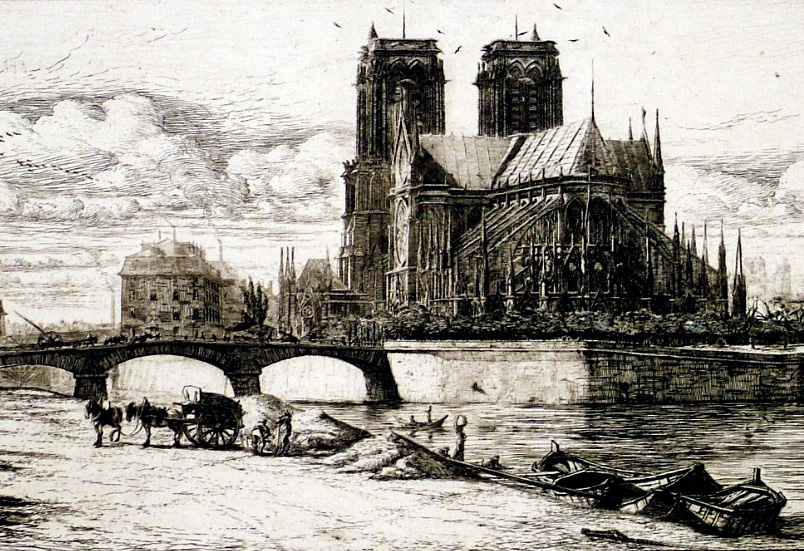In a post yesterday, I wrote about the almost complete destruction of the Celts in Gaul (which had roughly the same boundaries as today’s France). I mentioned that this genocide was so complete that the Gaulish language was wiped out, though linguists have worked hard to recover what they can of Gaulish. I also reflected a bit on how arbitrary our cultural inheritance is, dependent on the twists and turns of history.
As it is with culture, so it is with language also. Language and culture follow pretty much the same tracks down through the ages. Elements of the past are always there, right under our noses. This is particularly true of language.
In an odd way, the influence of the Gaulish language lives on in the modern world. French, of course, is a Romance language. Like all the Romance languages (French, Spanish, Italian, Portuguese and Romanian), French developed out of Vulgar Latin in places beaten down by the Roman empire. Latin is not a dead language. Far from it. It merely changed over time into something bearable and sustainable. Latin was too complicated and too dry, so, where common people were forced to speak it, the language changed according to the linguistic habits of the conquered people. Only the church retained formal Latin. Only the Roman church, frankly, could stand a language as stuffy and arrogant as Latin.
And so, today, insofar as the French language differs from Latin, the differences mainly reflect the linguistic preferences of the Gauls. I am going to quote a long paragraph from a classic work in linguistics, The French Language, written in 1933 by Alfred Ewert of Oxford. Ewert’s political assumptions would not pass muster with most Celtic historians today, and that’s one reason I want to quote this passage. It reveals the habit of Rome-worship that persists in many quarters even today, and it reveals the degrading attitude toward the Celts. After all, the conquerers get to write the histories. The very first sentence is hugely revealing, because it refers euphemistically to the “romanticization” of Gaul:
The romanticization of Gaul, which may be taken to begin with the formation of the Provincia Narbonensis (120 B.C.) and the conquest of the rest of Gaul (55 B.C.), brought with it the substitution of Latin for the native idiom of the Gauls. The latter was a Celtic tongue which it is impossible to characterize in detail, as only a few inscriptions of doubtful interpretation have come down to us. The examination of Celtic elements in various languages and the historical study of Celtic languages and extant Celtic monuments have not yielded results which place beyond doubt the contention that certain developments in the Latin of Gaul are to be ascribed to the persistence of linguistic habits of the Celtic population. We do know that the language of the Gauls presented affinities with Latin, and this fact accounts in part for the readiness with which they seem to have abandoned their native idiom. Among other inducements to do so one may cite the advantages of Roman citizenship, the hope of advancement and material benefits generally, all of which were contingent upon the adoption of the official tongue. To these must be added the fact that with the spread of Christianity the diffusion of Latin was furthered by the Church, which employed Latin solely, at first in the form of Vulgar Latin and subsequently in the form of Low Latin. Before these combined forces the native idiom, inadequate for the new conditions of life and identified henceforth with an inferior culture, yielded ground rapidly, although it lingered on in the country districts as late as the third or fourth century.
Roman citizenship?? Celts were carried off as slaves by the tens of thousands. And of course there is the usual stuff about the inferior culture. Whatever. But Ewart is right when he sticks to his field — linguistics, though he hedges the point a bit because of our lack of knowledge of Gaulish. But it boils down to: Insofar as the sound and structure of the French language differ from Vulgar Latin, the difference can largely or mostly be attributed to the persistence of the Gaulish tongue.
Once I realized this, my fondness for the strange music and the grammatical and syntactical logic of the French language greatly increased. And ever since the Norman conquest, when the French conquerers exerted a major influence on the English language, a touch of Gaulish came to be found in English too.


Goodday Daltoni, how are you? Interesting read; I can feel where your sympathies lie, and I agree with them. You may be interested to know that the Gaulish language is currently undergoing a revival a a modern language. All releveant information can be found at http://www.moderngaulish.com. Please feel free to use it as you see fit.
Steve Hansen